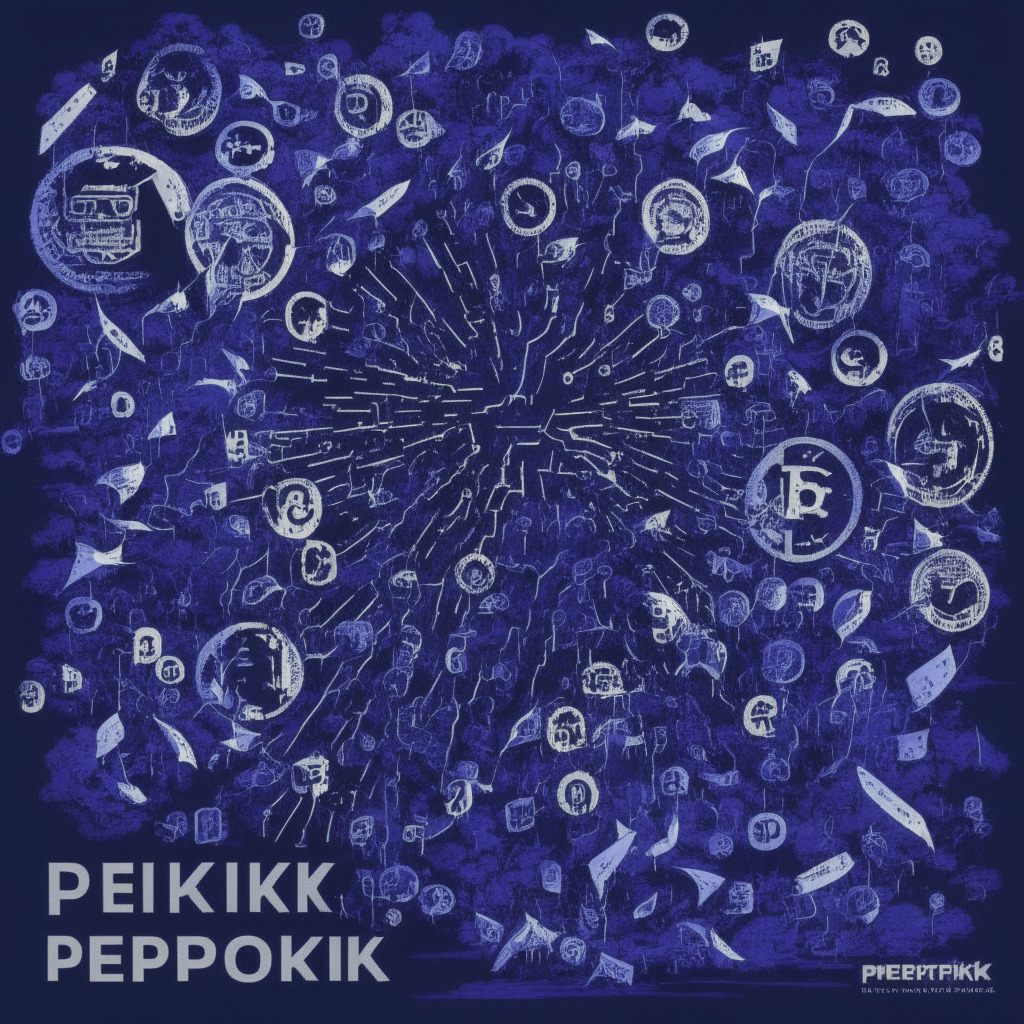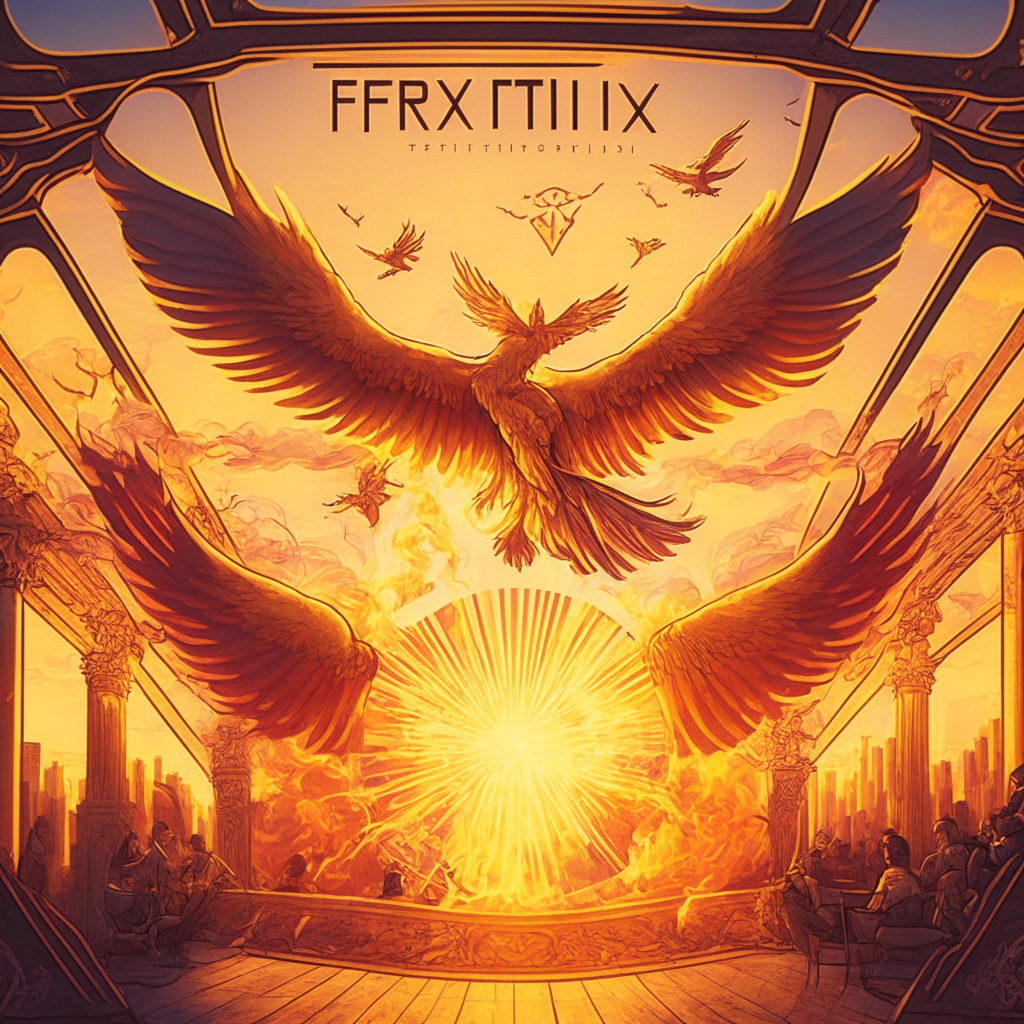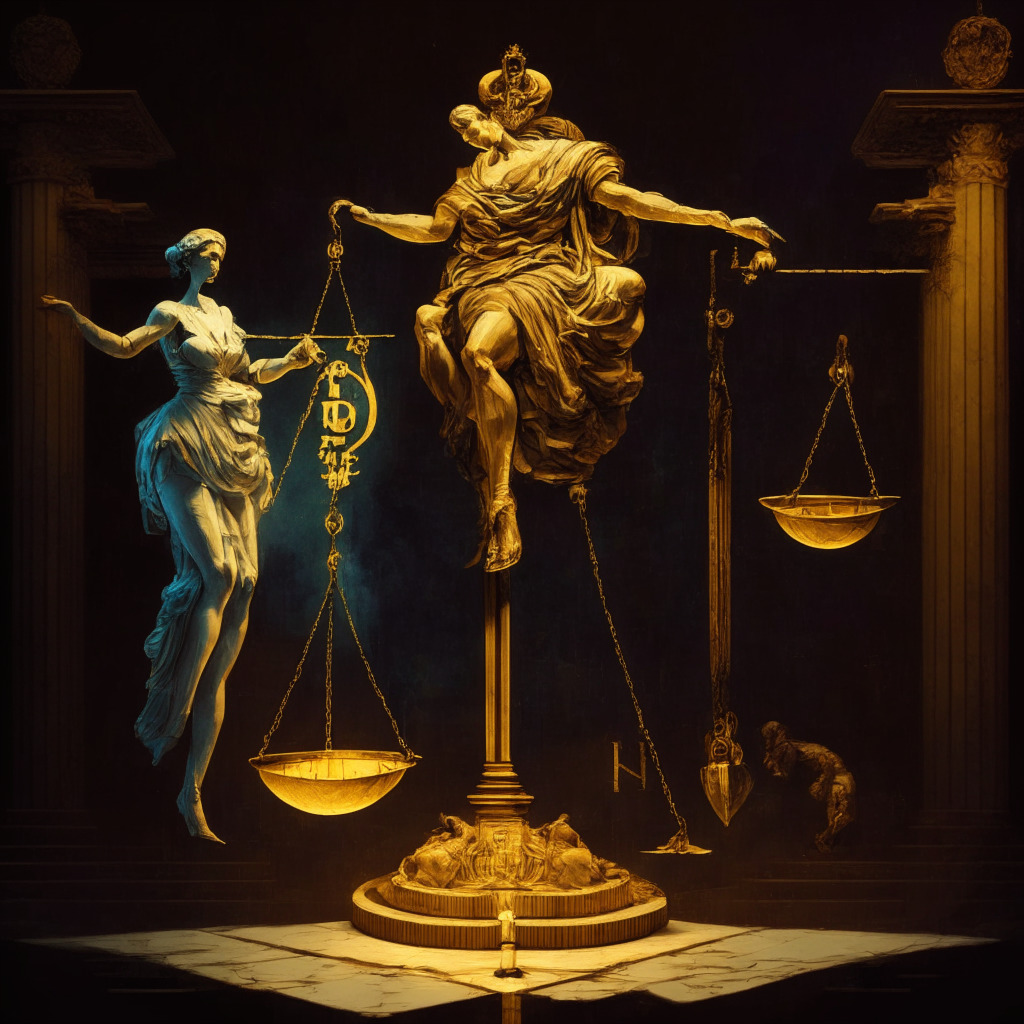Ledger’s announcement of their upcoming private key recovery service, Ledger Recover, sparked skepticism among the crypto community, raising concerns about potential attack vectors and compromising the security of Ledger hardware wallets. The company has delayed the service and plans to address user feedback in an upcoming Twitter Spaces town hall event.
Search Results for: trust
Binance Allegations: Analyzing User Fund Mixing Claims and Their Impact on Crypto Trust
Recent news alleges Binance mixed user funds with company revenue during 2020-2021, raising concerns regarding transparency and security of user assets. The matter highlights broader issues of trust and secure operations in the evolving crypto market.
Tornado Cash Attack: Hacker’s Change of Heart Raises Questions on Trust and Blockchain Security
A new proposal surfaces to potentially restore Tornado Cash’s governance after a malicious attacker hijacked it. Quick action by community member Tornadosaurus Hex aimed to limit damage while the attacker surprisingly signaled intent to return governance control. This incident highlights the need for constant vigilance in blockchain cybersecurity.
Governance Attack on Tornado Cash: Trust Eroded and Future Uncertain as TORN Price Plummets
A recent governance attack on crypto mixer Tornado Cash allowed attackers to gain full control, granting themselves 1.2 million votes through a malicious proposal. The attackers have been withdrawing TORN from the platform’s governance vault and trading it for Ethereum, causing TORN price to plummet 35% within 24 hours. Major crypto exchanges like Binance suspended TORN deposits as a precautionary measure.
Open-Source vs. Closed-Source Wallets: Analyzing Security Risks and Trust in Manufacturers
Charles Hoskinson, Cardano founder, prefers open-source software for security, while Ledger co-founder Eric Larchevêque argues it poses elevated security risks. Larchevêque believes closed-source wallets with secure elements offer higher security levels and states that security always involves trade-offs and requires trust in hardware wallets.
Ledger Recover Debate: Trust vs Trustlessness in Crypto Hardware Wallets
The launch of Ledger Recover, a service enabling Ledger hardware wallet users to back up their secret recovery phrases, has faced pushback from the crypto community due to concerns about seed phrase security. Ledger’s co-founder Éric Larchevêque responded stating that the wallet was never meant to be trustless and trust is necessary to use the product.
Cryptocurrency Rug-Pulls: How Swaprum’s $3M Exit Scam Exposes Trust Issues in the Crypto Space
Arbitrum-based decentralized exchange Swaprum allegedly conducted a rug-pull, swiping around $3 million of customer deposits. The culprits took 1,628 Ether from the platform’s liquidity pools and laundered it through Tornado Cash. The incident highlights challenges in crypto security and the importance of user vigilance and thorough research before investing.
Balancing Public Trust and Privacy: Cryptoasset Holdings of Lawmakers in South Korea Debated
South Korea’s Justice Ministry clarifies its stance on the cryptoasset holdings of public officials working with cryptocurrency regulations, assuring that bi-annual checks are conducted. Amidst controversies surrounding lawmakers owning cryptocurrencies, the debate over mandatory transparency versus private, personal information arises, with worldwide implications as the adoption of cryptocurrencies increases.
Ledger’s Key-Recovery Feature: The Privacy, Security, and Trust Dilemma in Crypto Wallets
Ledger’s new key-recovery feature, Ledger Recover, faces criticism as opponents argue it undermines the inherent security of hardware wallets. Privacy concerns arise since identities are linked to crypto wallets, and trust issues persist due to Ledger’s closed source code. The feature attempts to balance cold storage autonomy with custodial storage convenience, but increased security risks make its adoption uncertain among sophisticated users.
Paraspace NFT Drama: Unraveling Trust, Accountability, and Crypto Mismanagement
The Paraspace NFT protocol saga, involving the resignation of co-founder Jay Yao amid accusations of mismanagement of 2,909 Ether ($5.4 million), highlights potential pitfalls in cryptocurrency management and raises questions about trust and accountability within the blockchain community.
Swaprum Scandal: Balancing Trust, Transparency, and Decentralization in Crypto
The recent Swaprum exit scam on Ethereum Layer 2 network Arbitrum reveals the ongoing security challenges in the crypto world. This incident highlights the importance of credible security audits, regulatory framework, and user education in addressing growing concerns about hacks, scams, and the future of cryptocurrencies.
Ledger’s Recover Service Controversy: Unveiling Trust Issues and Understanding Security Models
Ledger faced backlash after launching its Recover service, a subscription offering that splits a user’s recovery phrase into three encrypted components. Concerns emerged over sensitive information security, trust in centralized entities, and possible backdoors. Ledger co-founder Éric Larchevêque called it a “total PR failure,” urging users to understand the complexities of the security model.
Ledger’s Deleted Tweet Controversy: Balancing Trust and Security in Crypto Wallets
Ledger CTO Charles Guillemet clarified that the wallet’s OS requires user consent before accessing private keys, dispelling concerns after a controversial tweet about firmware capable of extracting users’ private keys. The controversy highlights the delicate trust balance and the importance of transparency between wallet providers and users.
Italy’s AI Workforce Struggle and Blockchain’s Trust-building Potential
Italy allocates 30 million euros to support those at risk of losing jobs to AI-driven technology through Fondo per la Repubblica Digitale (FRD), promoting digital skills and accelerating digital transition. Recent AI chatbot ban in Italy triggers global conversation on AI policy and potential of blockchain for trustworthy AI framework.
Ledger’s Firmware Fiasco: Trust, Transparency, and the Push for Open-Source Crypto Wallets
Hardware wallets play a pivotal role in securing private keys and ensuring the safe storage of valuable digital assets. Recent concerns about Ledger’s controversial firmware update led competitor GridPlus to announce open-sourcing its firmware, promoting transparency and urging other manufacturers to follow suit. The debate highlights the importance of striking a balance between privacy, security, and trust in the cryptocurrency industry.
SEC vs Grayscale: Filecoin Trust Battle & Cryptocurrency Regulation Dilemma
The SEC recently requested Grayscale to withdraw its application for a Filecoin Trust product, igniting a debate about cryptocurrency classifications as securities. Grayscale plans to respond, arguing FIL isn’t a security. The regulatory outcome may affect the growth and innovation of the cryptocurrency industry.
Blockchain’s Role in Revolutionizing the Space Industry: Security, Trust, and Transparency
Blockchain technology can enhance the space industry by providing a secure, tamper-proof data communication network for spacecraft and satellites, protecting against cyberattacks, and increasing transparency for investors and partners in privatized space exploration missions. This improves security, trust, and efficiency in the burgeoning sector.
Ledger’s Controversial Update: Balancing Security, Privacy, and Trust in Crypto Wallets
Ledger’s hardware wallet is facing criticism after announcing an update that allows users to link their seed phrase to their identity card or passport, raising privacy concerns. This update necessitates trusting a third party with sensitive ID information, making recovery seed phrases potentially vulnerable to data leaks, hacks, and possible government surveillance.
Bancor Lawsuit Raises Questions on DeFi Trust and Impermanent Loss Protection
A recent class action suit against Bancor’s decentralized autonomous organization (DAO) alleges misleading investors about its impermanent loss protection mechanism and operating as an unregistered securities. This case triggers concerns about transparency, integrity in DeFi space, and highlights the importance of regulation, security, and investor trust in the rapidly evolving blockchain ecosystem.
Reviving FTX: Airdropping Exchange to Users, Regaining Trust and Compensating Creditors
Loomdart, co-founder of eGirl Capital, proposes relaunching FTX to compensate creditors, enhance industry trust, and revive its once-thriving community. A new FTX version could incentivize previous users through an “airdrop,” while keeping disgraced founder Sam Bankman-Fried away from the venture.
AI-Generated Content Scandals: Trustworthiness of News in the Digital Age
The Irish Times faced scrutiny after publishing an AI-generated article, raising concerns about digital news reliability and the need for stronger controls. The incident highlights challenges news organizations face in maintaining authenticity amidst increasing AI-generated content prevalence.
Unmasking Blockchain Immutability: A Dive into Accountability and Trust
Blockchains are not inherently immutable; rather, they offer accountability and trust. While past transactions remain unchangeable, balances and smart contract codes can be updated. The real value lies in ensuring any executed or altered element is specified, fostering transparency and security in applications requiring human collaboration and money management systems.
Balancing Act: Binance.US Considers Reducing Founder’s Stake for Regulatory Trust vs Decentralization
Binance.US is reportedly considering reducing founder Changpeng Zhao’s ownership stake to enhance the company’s reputation among U.S. regulators. This move could lead to greater trust, expansion, and a safer trading environment but also raises concerns about true decentralization and power concentration within the organization.
The Need for Regulating Crypto Custodians: Safeguarding Digital Assets and Building Trust
A robust regulatory framework specifically designed for custodians is crucial in the evolving cryptocurrency industry. Custodians mitigate risks by safeguarding digital assets, separating them from exchanges. Governments must establish transparent rules enabling custodians to operate legally, ensuring investor protection and a secure ecosystem.
SEC Probe on Marathon Digital: Crypto Trust Under Scrutiny or Transparency Boost?
Marathon Digital, a leading bitcoin mining company, faces a new SEC subpoena regarding its Montana-based data center operations, raising concerns about potential securities law violations. The company’s commitment to transparency and regulatory compliance will play a crucial role in navigating this investigation and maintaining investor trust in the rapidly evolving crypto and blockchain industry.
Grayscale’s New Trust and the Battle for US Spot Bitcoin ETF Approval
Grayscale Investments forms a new trust, Grayscale Funds Trust, aiming to launch a spot Bitcoin ETF in the US. Despite SEC’s previous rejections, Grayscale insists on the need for a regulated spot Bitcoin ETF and plans to expand its ETF business further.
Blockchain Future: Trust Building vs Security Concerns in a Rapidly Evolving Industry
The rapidly growing blockchain and cryptocurrency sphere fosters trust through decentralized systems, impacting industries like finance and supply chain management. However, concerns over safety, security, market volatility, and regulatory pressure must be addressed to ensure long-term sustainability and adoption. Collaboration and advancements in technology are essential for a successful future in this innovative space.
IRS Hits FTX With $44 Billion Claims: Trust in Crypto Exchanges Under Fire
The United States Department of Treasury and IRS filed 45 claims amounting to $44 billion against cryptocurrency exchange FTX and its subsidiaries, related to tax liabilities for FTX’s sister company Alameda Research LLC. The recent events question trust in cryptocurrency exchanges, and highlight the importance of understanding the regulatory environment and tax implications for such platforms.
Tether’s Soaring Reserves: Sign of Trust or Reminder of Controversies?
Tether Holding Limited reported a significant increase in reserves, reaching an all-time high of $2.44 billion in Q1 2023. Despite past controversies surrounding transparency, Tether has enhanced efforts to provide regular attestations and maintain stability, emphasizing the importance of thorough market research before investing in cryptocurrencies.
QuadrigaCX Update: Navigating Trust in Crypto Exchanges Amid Insolvency and Scams
Bankruptcy trustee Ernest & Young announced the interim distribution of funds tied to QuadrigaCX’s bankruptcy proceedings, scheduled “in the coming weeks.” The once-largest Canadian crypto exchange owes clients around $160 million. Users should remain vigilant in assessing the reliability of cryptocurrency exchanges while engaging in the crypto markets.
Paxful’s Comeback: Assessing Trustworthiness Amid Legal Turmoil and Leadership Changes
After a month-long hiatus due to a lawsuit and leadership disputes, the peer-to-peer Bitcoin marketplace Paxful is back online. However, the lack of transparency on the ongoing lawsuit and company leadership changes has raised concerns about its trustworthiness among some industry participants.
Declining Trust in Banks: Will Crypto Emerge as Safer Alternative Amid Financial Turmoil?
A recent Gallup poll reveals that 48% of respondents in the US are concerned about their money in banks, with 20% being “very concerned.” In the context of the US banking system’s challenges, it remains to be seen if cryptocurrencies can emerge as a more stable and secure alternative for consumer finances.































